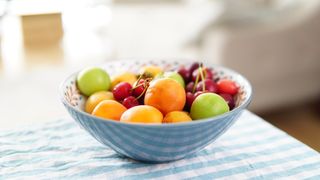
If you’re trying to hit a certain daily protein target in order to build muscle or lose weight, you might wonder which fruits are high in protein. There are many excellent sources available, and while the small amounts of protein contained in fruit may not make a huge difference to your overall consumption, they can still give you an extra protein boost.
Including fruits in your diet is also a great way to top up your intake of vitamins, minerals, fiber and health-promoting phytonutrients. However, fruits can’t be considered muscle-building foods. To make up the bulk of your protein requirements, it’s best to focus on including high protein foods in your meals, or invest in the best protein powder.
But if you want to achieve your fitness goals with more ease, here are seven fruits that are high in protein to include in your diet.
1. Guava fruit
When it comes to high protein fruit, guava takes the crown. It contains almost 4.2g of protein per cup, making it one of the most protein-rich fruits around.
Guava is a tropical fruit cultivated mostly in Central and South America. It’s known for its crunchy texture and sweet flavor that resembles a cross between pears and strawberries. Guava is a great source of fiber, vitamin C and potassium.
A review article of various studies published in Open Access: Toxicology & Research (opens in new tab) also suggested that guava contains health-promoting antioxidants, including quercetin, catechin and isoflavonoids. These compounds have been shown to have strong anti-inflammatory and antibacterial properties.
Wondering what’s the best way to eat guava? Think of it as you’d think of an apple. Just rinse it off and bite into it. The skin, flesh, and seeds are all edible.

2. Avocado
When thinking about fruits high in protein, chances are avocado wouldn’t cross your mind. However, this green, creamy fruit packs in a surprising amount of this macronutrient – almost 3g per cup.
At the same time, avocado is low in sodium and carbohydrates, so can easily fit into a low-carb diet, and is an excellent source of healthy fats, prebiotic fiber and potassium. According to a review published in the Nutrients (opens in new tab) journal, regular consumption of this green fruit can significantly reduce your risk of cardiovascular disease and improve your gut health.
Avocado is a versatile fruit. You can blend it to make guacamole, mash it on your toast or add it into a salad. Some people like their avocado sweet, served with sliced peaches and drizzled with honey.
3. Apricots
A cup of sliced fresh apricots contains nearly 2.2g of protein, while a cup of dried ones provides nearly 5g of this important macronutrient. Apricots are also low in calories, making them a perfect choice for those who want to lose weight.
Apricots are rich in vitamin A, vitamin C, vitamin E, carotenoids, potassium and zinc. They also contain a significant amount of health-promoting flavonoids, as described in the Molecules (opens in new tab) journal. Active compounds like catechin, quercetin, and chlorogenic acids may be credited for the anti-cancer, antioxidant and antiviral properties of apricots.
Apricots serve well as a quick, nutritious snack. Add them to a homemade trail mix or toss them in a salad to reap all the benefits of this high-protein fruit.

4. Kiwifruit
Kiwis are known for their refreshing, slightly acidic flavor that adds an exotic twist to smoothies and fruit salads. Perhaps a lesser-known fact is that this exotic fruit is high in protein and can provide almost 2.1g in a single cup.
Kiwis are low in calories and high in micronutrients such as potassium, vitamin C, vitamin E and vitamin K. According to a review published in the European Journal of Nutrition (opens in new tab), regular consumption of this fruit can also ease the symptoms of constipation and irritable bowel syndrome.
5. Blackberries
Although the strong acidic flavor may not be to everyone’s liking, blackberries are one of the healthiest berries around. One cup of raw blackberries contains nearly 2g of protein, while packing almost 8g in fiber and providing less than 7g of sugar.
Blackberries are also rich in manganese, magnesium, vitamin C and vitamin K.
Blackberries can be easily added to your breakfast muesli bowl or sprinkled into plain yogurt. These high-protein fruits are also great in smoothies, salads and desserts.

6. Oranges
One medium-size fresh orange contains around 1g of protein, while a cup of freshly peeled wedges provides up to 2g. This fruit is low in calories and high in fiber, vitamin A, vitamin C and calcium.
Owing to an array of powerful phytonutrients, citrus fruits boast many health benefits. Multiple studies (opens in new tab) have shown that oranges, lemons and other citrus fruits have strong antioxidant and anti-inflammatory properties, reducing your risk of developing cancer, heart disease and neurodegenerative conditions.
Oranges are great as a snack on their own or added to green salads, smoothies and chocolate-based desserts. You can squeeze them into a refreshing juice – although this way you may not get all of the protein.
7. Bananas
You can find a good amount of protein in bananas: one cup filled with sliced banana contains around 1.6g of this macronutrient. The fruit is rich in fiber and complex carbohydrates, making it a great source of energy even for the most demanding workouts.
Bananas also contain significant amounts of vitamin B6, vitamin C and potassium. And according to a review published in the Food Chemistry (opens in new tab) journal, they’re also high in many antioxidants and phytonutrients that may have a highly beneficial effect on our cardiovascular and nervous systems.
Bananas have a mild, sweet flavor that pairs well with many different dishes. Have it as a quick snack on-the-go, blend it into a smoothie or add it to your breakfast cereals – you can get creative with this high-protein fruit.

This article is for informational purposes only and is not meant to offer medical advice.

Anna Gora is a Health Writer for Future Plc, working across Coach, Fit&Well, LiveScience, T3, TechRadar and Tom’s Guide. She is a certified personal trainer, nutritionist and health coach with nearly 10 years of professional experience. Anna holds a BSc degree in Nutrition from the Warsaw University of Life Sciences, a Master’s degree in Nutrition, Physical Activity & Public Health from the University of Bristol, as well as various health coaching certificates. She is passionate about empowering people to live a healthy lifestyle and promoting the benefits of a plant-based diet.
Note: This article have been indexed to our site. We do not claim legitimacy, ownership or copyright of any of the content above. To see the article at original source Click Here











